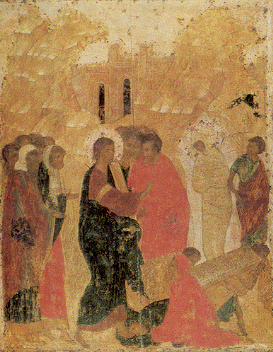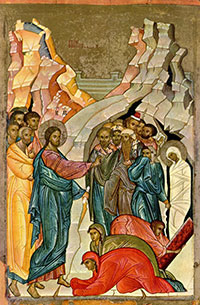Friday of the sixth week of Great Lent marks the end of the 40 days of preparatory lent, during which the Church taught us about repentance, inner prayer, the bearing of one’s cross, ascending the ladder of virtues; taught us to supplicate the Mother of God, in order to obtain the most powerful aid in the matter of penitence; and finally, as the supreme example of its teaching, the Church offered us the image of Saint Mary of Egypt, a great sinner, who, by means of penitence, fasting and obedience to the Holy Virgin, attained the angelic state in which man was originally created.

Now the Church turns to a direct commemoration of the historic events of almost 2,000 years ago, which were instrumental in achieving the salvation of mankind. The Jewish feast of Passover was approaching, and with it the last days of the Lord Jesus Christ’s life on earth. The rage of the Pharisees and the Jewish elders against Christ was extreme, and they waited for an opportune moment to seize the Lord and put Him to death.
Already at the start of the sixth week of Lent, church hymns begin to mention the illness of Lazarus, brother of Martha and Mary, from the town of Bethany. The Lord loved this pious family and often visited it. But Christ was not in Judea at this time, and the sisters sent word to Him of Lazarus’s illness. Then the Lord said to His disciples: “This sickness is not unto death, but for the glory of God, that the Son of God might be glorified thereby.” The Lord then deliberately stayed in place for two more days and finally said to His disciples: “Let us go into Judea. Our friend Lazarus sleeps, but I go to awake him.” Jesus Christ was telling them about Lazarus’s death, but the disciples thought that He was talking about ordinary sleep, which is often beneficial during an illness, and so they said: “Lord, if he sleeps, he shall do well.” Then Jesus said to them plainly: “Lazarus is dead, and I am glad for your sake that I was not there, so that you may believe. However, let us go to him.”
In one of the holiday hymns the Lord is called “the conqueror of death.” There have been many conquerors in the history of mankind: talented physicians conquered illness, military leaders conquered huge armies; there are conquerors of space and conquerors of distance. But the world does not know any other “conqueror of death” except Jesus Christ. None of the most prominent men in the world have ever aspired to that title. He alone could do so – our Lord and Saviour. During His life on earth He showed His power in three cases: the resurrection of the daughter of Jairus, the resurrection of the son of the widow from Nain, and the resurrection of Lazarus.
The death of the daughter of Jairus was a very recent death. She died while Christ and her father were on their way to her. Even Christ called her death “sleep,” but everyone laughed at Him, knowing that she had died. But He sent everyone out and, taking her by the hand, said: “Maiden, arise!” And her spirit returned, and she arose.
In the case of the son of the widow from Nain death had taken a stronger hold: the deceased had already been placed on a bier and not only carried out of the house, but was already being carried out of the city gates for burial. The Lord stopped the procession, touched the bier and said: “Young man, I say unto thee – arise!” The dead youth sat up and began talking. And Jesus gave him back to his mother.
And now – Lazarus. Here the triumph of death was final and complete. Lazarus had already been dead for four days. There was weeping all around, but no one had absolutely any hope of resurrection. And when the Lord said to Martha, the sister of the deceased: “Thy brother shall rise again,” even she answered: “I know that he shall rise again in the resurrection on the last day.” And here the Lord spoke wondrous and remarkable words, which are a pledge of eternal life also for all of us, Orthodox Christians: “I am the resurrection and the life; he that believes in Me, even though he were dead, shall live again. And whosoever lives and believes in Me, shall never die.”
Then the Lord, seeing Martha and Mary weeping, and all the Jews who came with them also weeping, in His humanity felt grief Himself, and wept. Finally He said: “Take away the stone.” At this point even the deceased’s sister could not contain herself and said to Him: “Lord! He rots already, for he has been dead four days.” And so the stone was taken away from the cave where the dead man lay. And Christ cried out in a loud voice: “Lazarus! Come forth!” And the dead man came forth, bound hand and foot with graveclothes, and his face was bound about with a napkin. And Jesus said to them: “Loosen him, and let him go.”
Then many of the Jews who were there and had seen the incredible miracle came to believe in Jesus Christ. But others went to the Pharisees and told them of what Jesus had done. Christ’s enemies became worried, and fearing that the entire populace might come to believe in Christ, they convened a council and decided to kill Him. But news of the great miracle spread all over Jerusalem. Many Jews came to the house of Lazarus to see him, and having seen him, believed in Jesus Christ. Then the Jewish elders decided to kill Lazarus, too. But Lazarus lived for a long time after his resurrection, and later served as bishop on the island of Cyprus
Homily for the Saturday of Lazarus
In today’s troparion we heard the following words: “Thus we, too, cry out to Thee, the Conqueror of death: hosannah in the highest, blessed is the One who comes in the name of the Lord!” Today’s holiday is truly great, dear brethren! Just think of these words: “Conqueror of death!”
There were many conquerors in the history of mankind: there were talented physicians who conquered many illnesses; there were famous military leaders who conquered huge armies and entire countries. There are conquerors of space, there are conquerors of distance, etc. But the world does not know a single “conqueror of death” except for the Lord Jesus Christ. He alone bears this distinction. Even the world of unbelievers is unable to propose any other name. None of the most prominent people in the world have ever pretended to such a distinction. Yet He is, has been, and will be – our Lord and Saviour, the conqueror of death.
During His life on earth the Lord gave proof of this in three cases: the resurrection of the daughter of Jairus, the resurrection of the son of the widow of Nain, and now today – the resurrection of Lazarus.
The death of the daughter of Jairus was a recent, fresh death. The girl died while Christ and her father were on their way to her. Even Christ called it “sleep,” but other people laughed at Him, knowing that the girl had died. But He made everyone leave the room, then took her by the hand and said: “Maiden, arise!” And her spirit came back to her, she arose, and He commanded that she be given food.

In the case of the son of the widow of Nain death had asserted its rights more strongly: the deceased had already been placed on a bier, he not only had been carried out of his house, but was being carried out through the city gates. The Lord had to stop the bearers in order to approach the bier. And only then He said: “Young man, I say to you, arise!” The dead youth sat up and began speaking. And Christ gave him back to his mother.
And now there is Lazarus. In this case death’s victory was final, it was 100% complete. Lazarus had already stayed in the tomb for four days. There was great weeping, but no one had any hope whatsoever of his resurrection. Even one of the deceased’s sisters said to the Lord: “I know that he shall arise again in the Resurrection on the last day.” And even the Lord Himself, seeing her weeping and all the others together with her, was troubled in spirit and wept. Finally He said: “Take away the stone.” At this point the deceased’s sister could no longer endure and cried out to Him: “Lord, he is already malodorous, for he has been dead four days.” But still the stone was lifted from the cave where the dead man lay, and the Lord cried out in a loud voice: “Lazarus! Come forth.” And the dead man came out, bound hand and foot with graveclothes. Jesus said to them: “Loosen him and let him go.”
But aside from physical death there is also spiritual death. It happens thus: a sinful thought passes through our mind and incites in us a sinful feeling, but the soul comes to its senses, cries out to the Lord in repentance, and the Lord extends His hand as to the daughter of Jairus and says: O soul, arise! And once again life goes on joyfully. But it may also happen that we do not come to our senses in time, and sin enters our soul more deeply, but even then, through the prayers of the Church, our soul can still rouse itself, can repent, and the Lord will say to us as He did to the son of the widow of Nain: O soul, I say unto thee – arise! And our soul will come alive again and will be granted salvation.
But what is to be done if sin enslaves our soul completely, covers it as though with a huge burial stone, and turns into a passion which becomes sinfully malodorous… as in the case of Lazarus? What do we do then? In this case we have great need of confession, the sacrament which has been established by the Lord Himself. Look at how it is reflected in the resurrection of Lazarus. Lazarus could not leave the burial cave by himself – it was covered by a huge stone. He could not even walk properly, because he was bound hand and foot by the graveclothes. And at this point Christ said to His disciples: loosen him. Applied to us this means that the Lord commands clergymen, who have received the gift of the Holy Spirit in the sacrament of ordination, to absolve our sins which bind us hand and foot. What joy for us! For death is not the cause, but only the result or consequence of sin. And Christ is also the conqueror of sin, and together with it – of death itself. Let us triumphantly proclaim: hosannah in the highest! Amen.
(From “The One Thing Needful” by Archbishop Andrew of Novo-Diveevo)